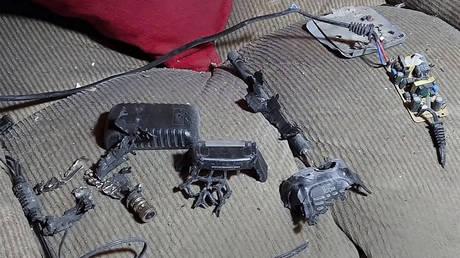CNN divulges information on ‘sophisticated’ pager assaults targeting Hezbollah
According to a report by CNN, the explosives intended for targeting Hezbollah officials were hidden within the batteries of the pagers.. source:TROIB RTS

A recent CNN report reveals an alleged Israeli plot aimed at senior members of Hezbollah that involved explosives hidden within pager batteries, rendering them nearly undetectable.
Earlier this month, powerful pager explosions in the Middle East resulted in the deaths of 12 people and injuries to around 3,000, including several officials from the Lebanese-based Islamist movement. The blasts were followed the next day by portable radio explosions that claimed at least 20 additional lives. Iran and Lebanon attributed the attacks to Israel, a claim that West Jerusalem has denied.
CNN cited an unnamed Lebanese official familiar with the investigation who described the sophistication of the explosive concealment, stating it was “so sophisticated that it could not be detected.” Another official emphasized that the materials were “laced” into the pager’s lithium battery, making them virtually impossible to identify, and remarked that he had “never seen anything like it.” Controlled explosions of the pagers were witnessed by Lebanese officials, who noted the potential devastation the devices could have caused to their users.
Sean Moorhouse, an expert in explosive ordnance disposal, explained to CNN that an improvised explosive device typically consists of five essential components: a power source, initiator, detonator, explosive charge, and case. He noted that a pager could be weaponized by integrating just a detonator and an explosive, while achieving near-total undetectability by encasing these components in a metal shell resistant to imaging technology.
Reports indicate that the pagers featured the logo of Gold Apollo, a Taiwanese company that has strongly denied any involvement. The firm claimed it had authorized the use of its brand on pagers manufactured by BAC Consulting, a company based in Budapest. Senior Taiwanese officials also stated that Gold Apollo did not produce the lithium battery pagers used in the recent attacks.
European authorities are reportedly investigating both BAC Consulting and Norta Global Ltd, a Bulgarian firm, concerning their roles in the sale of the pagers to Hezbollah. However, Lebanese officials have refrained from attributing blame to specific companies, asserting that the pagers “were tampered with from foreign entities before being delivered to Lebanon and modified to send electronic signals that led these devices to be exploded.”
Sophie Wagner for TROIB News












